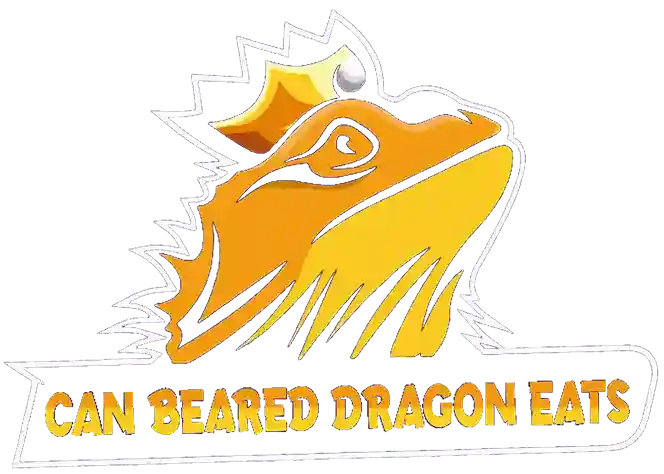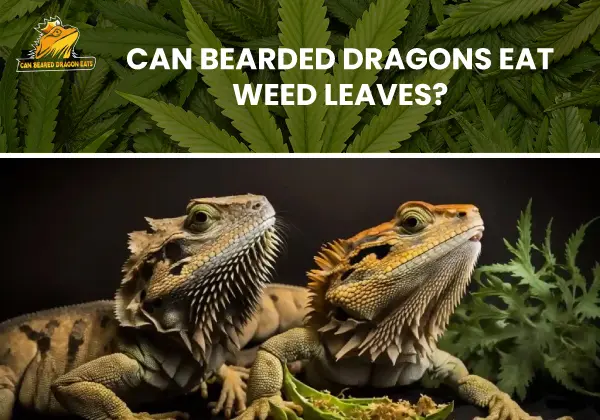As I sat with my bearded dragon, basking in the warm glow of his terrarium, a thought crossed my mind Can Bearded Dragon eat Weed Leaves? I couldn’t resist the urge to explore this unconventional question: can bearded dragons eat marijuana leaves? I dove into research and consulted with reptile experts to uncover the truth. As it turns out, feeding weed leaves to bearded dragons is controversial, with differing opinions and anecdotes floating around.
In this blog post, I’ll share my findings and provide insights into whether or not bearded dragons can safely consume weed leaves. So, if you’re a fellow bearded dragon owner who’s ever wondered about this topic, read on to satisfy your curiosity and learn about feeding weed leaves to these fascinating reptiles!
Read more : Can Bearded Dragons Eat Chard?
The Controversy: Can Bearded Dragons Eat Weed Leaves?
The controversy surrounding whether bearded dragons can eat weed leaves has sparked various opinions and anecdotes within the reptile community. Let’s delve into this topic and explore the conflicting viewpoints on this controversial issue.
Exploring Conflicting Opinions
Some reptile owners and enthusiasts believe that feeding weed leaves to bearded dragons is safe and can provide additional nutrition to their diet. They argue that weed leaves are a natural food source that bearded dragons may encounter in the wild and can be offered as a part of a varied and balanced diet.
Proponents of this view claim that weed leaves are high in fiber, vitamins, and minerals that can benefit the health of bearded dragons. On the other hand, there are concerns about potential risks associated with feeding weed leaves to bearded dragons. Many reptile experts and veterinarians caution against this practice, as weed leaves may contain harmful substances, such as pesticides, herbicides, or other chemicals that can be toxic to reptiles.
Presenting Perspectives from Reptile Experts and Forums
Reptile forums and communities often have differing opinions and anecdotes about feeding weed leaves to bearded dragons. Some owners may share their positive experiences of offering weed leaves to their bearded dragons without any apparent adverse effects.
However, others may recount negative experiences, such as digestive issues or other health complications, after feeding their bearded dragons weed leaves. Reptile experts and veterinarians often weigh in on this controversy as well. While some may advocate caution and avoid feeding weed leaves to bearded dragons due to potential risks, others may argue that it can be done safely with proper preparation and precautions.
They may emphasize the importance of thoroughly researching and understanding the nutritional content of weed leaves and considering the species, age, and size of the bearded dragon before incorporating them into their diet.
Nutritional Content of Weed Leaves
Weed leaves, like any other food, have their own nutritional composition that can impact the health of a bearded dragon. Conducting research on the nutritional value of weed leaves can help determine if they are a suitable addition to their diet.
Examining the Nutritional Value: Conducting thorough research on the nutritional content of weed leaves, such as the levels of protein, fiber, vitamins, and minerals, can provide insight into their potential benefits or risks as a food source for bearded dragons.
Analyzing Risks and Benefits: Weighing the potential risks and benefits of including weed leaves in a bearded dragon’s diet is crucial. While weed leaves may contain some beneficial nutrients, they can also have potential risks, such as high levels of oxalates or other toxic compounds that can cause digestive issues or other health problems in bearded dragons.
Assessing Suitability for Bearded Dragons
Determining Suitability: Based on the nutritional content of weed leaves and the potential risks and benefits, it’s important to assess their suitability for bearded dragons. Factors such as the species, age, and size of the bearded dragon, as well as their overall dietary needs, should be considered.
Consulting with Experts: Seeking advice from reptile experts, veterinarians, or experienced bearded dragon owners can provide valuable insights on whether or not weed leaves are a suitable addition to their diet.
What Factors to Consider for Safe Feeding Weed Leaves To Bearded Dragon?
Regarding feeding bearded dragons, several factors need to be considered to ensure their safety, including their species, age, and size.
Here are some guidelines to keep in mind when considering incorporating weed leaves into their diet, if applicable:
Species Considerations
Different species of bearded dragons may have varying dietary requirements and tolerances. It’s important to research and understands the specific dietary needs of your bearded dragon’s species before offering any new food, including weed leaves.
Some species of bearded dragons are more herbivorous, while others are omnivorous or insectivorous. This can impact their ability to digest and process weed leaves and their nutritional needs.
Age and Size Considerations
Younger bearded dragons may have different dietary needs than adults, as they are still growing and developing. It’s crucial to provide age-appropriate nutrition and avoid offering food that may be difficult for them to digest.
The size of your bearded dragon can also impact its ability to consume and digest weed leaves. Smaller bearded dragons may struggle to eat larger leaves, while larger bearded dragons may have no issue with them.
Guidelines for Safe Feeding
Always thoroughly research and identify the specific type of weed before offering it to your bearded dragon.
- Avoid offering any weed treated with pesticides, herbicides, or other chemicals that can be harmful to reptiles.
- Wash the weed leaves thoroughly to remove any dirt, debris, or potential contaminants before feeding them to your bearded dragon.
- Offer weed leaves as part of a varied and balanced diet rather than as the sole or primary food source.
- Monitor your bearded dragon closely after offering weed leaves for any signs of digestive issues, such as diarrhea or vomiting, and consult with a reptile veterinarian if any concerns arise.
Alternative Food Options To Give Your Bearded Dragon
When it comes to the diet of bearded dragons, it’s important to ensure that they are provided with safe and nutritious food options. Here are some considerations for alternative food options to include in their diet:
Safe and Nutritious Alternatives
Leafy greens such as collard greens, Broccoli Leaves, mustard greens, Cauliflower Leaves, and dandelion greens are excellent sources of essential vitamins and minerals for bearded dragons. They are low in oxalates and can be safely included in their diet.
Vegetables like bell peppers, squash, and carrots can also be added to a bearded dragon’s diet. These provide additional nutrients and variety to their diet.
Some fruits like papaya, mango, and blueberries can be offered as occasional treats to bearded dragons, as they are high in natural sugars and should be fed in moderation.
Insects such as crickets, Dubia roaches, and mealworms are important protein sources for bearded dragons, especially for juveniles. They should be gut-loaded and dusted with calcium powder before feeding.
Can bearded dragons digest weed leaves properly?
Bearded dragons may have difficulty digesting weed leaves due to toxic compounds or lack of proper nutrients. Digestive issues, such as impaction, can occur if bearded dragons consume weed leaves.
How To Feed Weed Leaves To Bearded Dragon?
Feeding weed leaves to baby and juvenile bearded dragons is not recommended due to the potential risks associated with toxic compounds and lack of proper nutrients. It is important to provide a balanced and appropriate diet that meets the specific dietary needs of these young reptiles.
It is crucial to consult with a qualified reptile veterinarian or a reptile nutritionist before attempting to feed weed leaves to a baby or juvenile bearded dragon. They can provide expert advice and guidance based on the specific needs of your bearded dragon and the type of weed leaves you are considering feeding.
In general, baby and juvenile bearded dragons require a diet that is high in protein, calcium, and other essential nutrients for their growth and development. Commercially available, age-appropriate bearded dragon food pellets or insects such as crickets, mealworms, and Dubia roaches are recommended as the primary food source for young bearded dragons.
What Are The Risks of Feeding Weed Leaves To Bearded Dragons?
Feeding weed leaves to bearded dragons can come with potential risks that need to be carefully considered. Here are some subheadings that delve into the risks associated with feeding weed leaves to bearded dragons:
Toxicity Concerns
Wide weed varieties may contain toxic compounds that can be harmful or even fatal to bearded dragons. Some weeds, such as dandelion, plantain, and clover, are generally safe for bearded dragons to consume in moderation. However, other weeds may contain toxic substances, such as oxalates, nitrates, or pesticides, which can be harmful to bearded dragons and can cause digestive issues, kidney problems, or even death.
Nutritional Imbalances
Weed leaves may not provide the appropriate balance of essential nutrients that bearded dragons need for their overall health and well-being. Bearded dragons require a specific balance of calcium, phosphorus, vitamins, and minerals for proper growth and development. Feeding weed leaves as a significant part of their diet may result in nutritional imbalances that can lead to health issues, such as metabolic bone disease, weakened immune system, and stunted growth.
Digestive Upset
Bearded dragons have a sensitive digestive system, and introducing new or unfamiliar foods, such as weed leaves, can disrupt their digestive process. Some weed leaves may be difficult to digest or cause gastrointestinal upset, leading to diarrhea, bloating, or discomfort.
Pesticide Contamination
Weed leaves growing in the wild may have been exposed to pesticides or other harmful chemicals, which can pose a risk to bearded dragons if consumed. Pesticide residue on weed leaves can cause toxicity and adverse effects on the health of bearded dragons.
Lack of Control over Quality and Safety
Feeding weed leaves to bearded dragons may come with uncertainties about their quality and safety. Wild weed leaves may have been exposed to environmental contaminants, pollution, or pathogens, which can be harmful to bearded dragons.
Can weed leaves cause poisoning in bearded dragons?
Weed leaves may contain toxic compounds that can cause poisoning in bearded dragons, leading to digestive issues, lethargy, loss of appetite, or other health problems. It is important to avoid feeding weed leaves to bearded dragons.
Can You Smoke Around Your Bearded Dragon
It is best to avoid smoking or exposing your bearded dragon to any type of smoke. Smoke from tobacco, cannabis, or other substances can harm their respiratory system and overall health. It is important to create a smoke-free environment for your bearded dragon to ensure their well-being.
Read more : can bearded dragons eat red cabbage?
Conclusion
While weed leaves may seem like a potential food option for bearded dragons, there are several risks to consider. Toxicity concerns, potential nutritional imbalances, digestive upset, pesticide contamination, and lack of control over quality and safety are all important factors to be aware of when considering feeding weed leaves to bearded dragons. It is crucial to prioritize the health and well-being of these reptiles by thoroughly researching and consulting with reptile experts or veterinarians before introducing any new food items into their diet.
As responsible pet owners, it is our responsibility to provide a balanced and appropriate diet for our bearded dragons, taking into consideration their species, age, size, and individual needs. Opting for safe and nutritious food options specifically formulated for bearded dragons, such as commercially available bearded dragon pellets, fresh vegetables, fruits, and insects, is generally recommended. These foods are specifically designed to meet the nutritional requirements of bearded dragons, helping to ensure their optimal health and well-being.
- Eastern Bearded Dragon - July 26, 2024
- Why Do Bearded Dragons Bob Their Heads? - July 25, 2024
- Everything You Need to Know About Paradox Bearded Dragons - July 10, 2024

